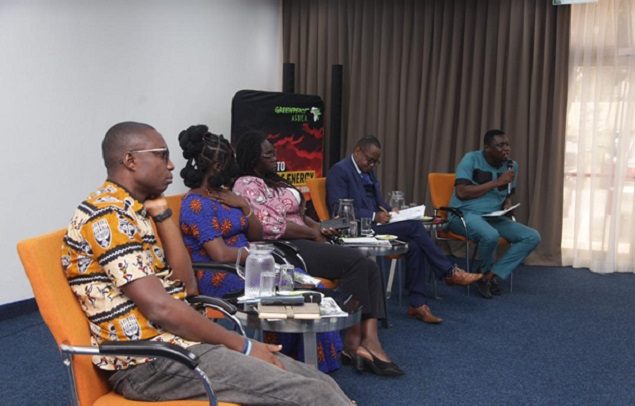A scene during the event
GREENPEACE AFRICA, a multinational African nonprofit organization working to advance climate actions and reforms on the continent, has urged African leaders to demand that funding for climate-related works on the continent be made readily accessible to African states to help in addressing the many impacts of the phenomenon on the continent.
This comes as the United Nations (UN) prepares to introduce the UN Tax Convention which is expected to among others, provide a roadmap on how nations should/would tax multinational corporations.
The group, at a forum held in Accra on the sidelines of the 20th anniversary of the African Union Economic and Social Cultural Council (AU-ECOSOCC), stressed on the need for financial reforms in addressing climate crises and achieving socio-economic well-being for Africans to be implemented.
The forum sought to also create a platform for stakeholders and civil society organizations (CSOs) across the continent through the Greenpeace Africa flagship programme – Climate Justice Movement (CJM) – to call on heads and leaders of various African states at the AU-ECOSOSC to consider climate funding in their agenda; and also to explore ways by which the proposed UN Tax Convention would benefit Africans in the face of climate crises.
Senior Political Advisor at Greenpeace Africa, Fredrick Njehu, stated that the role of African governments in the face of the proposed UN Tax Convention will be to look for avenues to raise money for climate finances, saying that the UN has in places different climate financing programs of which African countries can benefit greatly from.
“From the Global Environment Facility, Global Climate Fund etc., these are all funds that African countries should be able to access easily and in more transparent and equitable manner; and that is what we are calling for–that we as African countries are able to access the resources. And these resources are supposed to be beneficial to the communities that we work in”, he said.
Monitoring, Evaluation and Learning Manager at Greenpeace Africa Romaric Samson, also called for the “decolonisation and customization” of the processes surrounding climate financing for African states.
“Decolonisation” he explained, “is making sure that whatever action or decision is taken is really Africa-oriented, to ensure that whatever we are saying really fits into the context of Africans and helps address their needs.
“As the decolonisation phase ends”, he continued, “then we need to think of how to customise; and that customisation speaks to how do we adapt the solution to the needs of our community to make sure that beyond the climate financing, whatever interventions are being financed, will continue to remain sustainable so that they also continue to have action on the ground to support their their fight against environmental and climate hazards.”
For his part, Chibueze Ezekiel, founder and leader of the Strategic Youth Network for Development, a youth-led climate action CSO in Ghana, stressed on the need to identify and eradicate any potential loopholes in climate financing to ensure that climate funds are used strictly for what they are intended for to achieve maximum results.
“Africa has come to a conclusion that we need $1.3 trillion to address our climate issues. But more importantly, how you can track the inflows or the funding – from the national level to the local level? And one other area has to do with the UN Tax Convention. How do we ensure that we are not losing resources in the name of illicit financial flows? How do we block the loopholes so we can save money in the country to implement our climate action. So for me, those are some of the key areas to look into”, he said.
BY Nii Adjei Mensahfio


